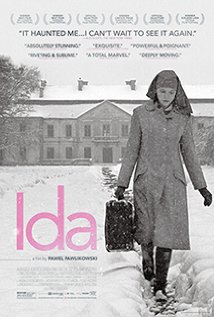First oscar in the best foreign-language film category for Poland! Posted by Kasia on Feb 26, 2015 in Culture
Yes, I know…you probably already heard about it. However, I think, it is such a great achievement, that it is definitely worth mentioning more than few times!
 “Ida”, directed by Poland’s Paweł Pawlikowski, has won the Oscar for best foreign language film, defeating the much-fancied Russian anti-Putin satire Leviathan, and becoming the first Polish film to win the award!
“Ida”, directed by Poland’s Paweł Pawlikowski, has won the Oscar for best foreign language film, defeating the much-fancied Russian anti-Putin satire Leviathan, and becoming the first Polish film to win the award!
Telling the story of a novice nun in 1960s Poland who discovers she is Jewish just before she is to take holy orders, Ida emerged as a strong awards contender (kandydat) after winning the best film award at the London film festival in 2013. It has since battled with Leviathan at all the major awards ceremonies since, winning the Bafta for best foreign film and best film at the European film awards, but losing out at the Golden Globes.
In a majestic convent (majestatyczny klasztor), an orphaned young woman—a novice named Anna (Agata Trzebuchowska)—is ordered by her Mother Superior (Matka Przełożona) to visit her aunt in Lódź before she takes orders. A beautiful eighteen-year-old with a broad Slavic face, a composed, devotional manner, and a tantalizing dimple, the girl has never left the convent before and knows nothing of her family. In Lódź, wearing her habit, Anna enters the apartment of a forty-five-ish woman, who is puffing on a cigarette and waiting for the guy she picked up the night before to leave. A minor state judge and Communist Party member, Wanda Gruz (Agata Kulesza) tells her niece that her real name is Ida Lebenstein, and that she’s Jewish—a “Jewish nun,” she says. Abrupt and dismissive, Wanda enjoys attacking the girl’s ignorance. But Wanda has mysteries of her own and scores to settle: Ida’s mother was her beloved sister. The two agree to go to the village in which the parents were hidden by Christians and then betrayed—the village where Wanda grew up.
“Ida” becomes both an investigation of sorts and an intermittent road movie, featuring a dialectically opposed odd couple—Catholic and Communist, innocent girl and hard-living political intellectual, lover (of Christ) and hater (of the Polish past). Yet neither is a type, and what happens to each has to be understood as both an individual’s fate and a Polish fate. Ida’s faith and disciplined simplicity will be jostled by experience, and Wanda will be tested, too, as her own buried sorrows come back to life. Sardonic comedy lurks within the strange pairing. At first, Wanda can’t stop taunting Ida’s indifference to sex, and, about the village, she says, “What if you go there and discover that there is no God?” Yet Pawlikowski doesn’t favor one point of view over the other: the two women are equal in their isolation and their need to pull together the shards of identity in a country that has been almost entirely broken…
Poland is the home of some of the world’s best-known filmmakers. Among Oscar winners from Poland or with Polish connections are Roman Polański, who was born in France but also holds Polish citizenship (for The Pianist); cinematographer Janusz Kamiński (Schindler’s List); and veteran director Andrzej Wajda, who received an honorary Oscar. The nation of 40 million people had never won the foreign-language category despite nine previous nominations over the past half century, including Agnieszka Holland’s In Darkness in 2011 and Polanski’s Knife in the Water in 1963.
I would love to know if any of you has seen “Ida’ and what is your impression of the movie! Please share it with us in a few words in comments below:)
Do następnego razu… (Till next time…)

Build vocabulary, practice pronunciation, and more with Transparent Language Online. Available anytime, anywhere, on any device.
About the Author: Kasia
My name is Kasia Scontsas. I grew near Lublin, Poland and moved to Warsaw to study International Business. I have passion for languages: any languages! Currently I live in New Hampshire. I enjoy skiing, kayaking, biking and paddle boarding. My husband speaks a little Polish, but our daughters are fluent in it! I wanted to make sure that they can communicate with their Polish relatives in our native language. Teaching them Polish since they were born was the best thing I could have given them! I have been writing about learning Polish language and culture for Transparent Language’s Polish Blog since 2010.




Comments:
Sergio:
I have yet to see it but as soon as I get the opportunity I will watch it. So happy for this win for Poland! Great article.
Ingrid:
Hi,
I found your post by searching for the newest date here on the blog!
I do not speak Polosh and do not really intend to lesrn it though it might be an interesting exercise for aging brain cells!
I live in New Zealand and have inherited a wallhanging that was obviously made in Poland.
The label on the back reads as follows:
Anna Skaza-Galkowska, Krakow, 1986
The search I started did not give me any result, so I thought I look on ebay and some how I came to this blog about Polish.
For some reason I would like to find the woman who made it. Or at last find out about her.
The artwork was in possession of an Australian nurse who moved to NZ..
She could have traveled to Krakow or the weaver could have had a connection to the Anthroposophical Movement/ Waldorf School and might have been in Switzerland where they could have met or the wallhanging was part of an exhibition or given in exchange of services.
Lots of ideas. Anybody out there reading this and wanting to help?
Looking forward to hearing from you!
Ingrid